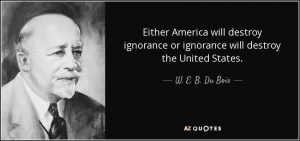Art at the Intersection, a Mel Phillips piece
W.E.B. DuBois And the Art of Intellect
Note: As a general 20th century bad ass in the battle of the color line, this African American activist, writer, orator and vocal agitator smartly marshaled history, science and academia into the fray of international dialogue on racial injustice. Mr. DuBois was a lifelong freedom fighter who did his part to help our nation continue to unravel the blanket of racism spread throughout this country, and for me a hero of my history. I wrote this tribute article several years ago, and I pulled it from the archives and dusted it off to present it again for Black History Month. Heroes never die.
 W.E.B. DuBois And the Battle of The Color Line
W.E.B. DuBois And the Battle of The Color Line
His life is the groundwork upon which contemporary black American culture is anchored. Much of the cultural richness black and brown Americans hold today is due largely to the amazing achievements of this one man. His vast legacy conjures varying images for his familiars. Few other Americans played a more prominent and dominant role in the first half of the twentieth century to restore the humanization of the Afro-American consciousness than William Edward Burghardt DuBois.
For nearly seven decades W.E.B. DuBois was the passionate voice of freedom for all disenfranchised Americans. His public agitation and impassioned activism forced the country to face its slavery-born demons of oppression, racism, intolerance and injustice. As a writer, free-thinker and militant public speaker, W.E.B. DuBois did more than any other person during the first half of the last century to completely dismantle the foundations of scientific racism upon which many societies relied to support atrocious national behavior, like caste and genocide. He conducted vast research studies that not only shed new scientific light on American race relations, but also helped dispel long-held social myths about black people. His work went far to revoke racial stigmas and stereotypes unduly ascribed to blacks long before slavery and far after Emancipation. DuBois promulgated the idea of human dignity and equality for all. The overall extent of his lifework reveals him as the premier leader, historian and cultural steward of black American tradition and heritage in the last one hundred years. Few others come close.
Born in 1868 to an elite, prominent black family in Great Barrington, Massachusetts, W.E.B. DuBois attended integrated schools where he exhibited an intellect beyond his peers. Graduating from high school early, and at the very top of his class, was just one of many academic firsts that DuBois would realize in his incredible lifetime. After first receiving a baccalaureate degree in 1888 from Fisk University, DuBois entered Harvard University in 1890 to study philosophy. While there he was an eminent member of Alpha Phi Alpha Fraternity, the first intercollegiate Greek-letter fraternity for black Americans. In 1891 DuBois completed his master’s degree and soon became the first black man ever to receive a Harvard Ph.D.
While working on his doctoral thesis at Harvard, W.E.B. DuBois first conceived the idea of subjecting the issues of modern race relations to the rigors of scientific scrutiny. The result, “The Suppression of the Slave Trade in America”, is acclaimed as arguably the most influential social science dissertation ever produced in any American university. It later was published as the first volume in the Harvard Historical Series; he was only twenty-four years old. White supremacist political, social and caste culture ideology was at its pinnacle when young Mr. DuBois began his academic and public pursuits. His charge to deliver the message for racial equality would not be easy. Between 1897 and 1914 Dubois conducted copious studies of black society in America, publishing sixteen research papers. His intellect was impressive for its range, insight, meticulous detail, precision and innovation.
Recognizing that science and academia alone were insufficient vectors for social change, W.E.B. DuBois initiated and led many international mass movements. In 1900 he helped organize the First Annual Pan-African Congress in Paris, France. In 1905 he helped found the Niagara Movement, an early prototype of the NAACP which he would go on to co-found in 1909. He also helped establish the Council on African Affairs, helped organize the First Universal Races Congress in London, England, was a founder of the World Peace Council, and a protester against the cold war.
W.E.B. DuBois was one of the twentieth century’s great intellectuals. He challenged conventional American wisdom and Western ideology, and saw race in a global perspective. DuBois published books and essays in magazines throughout the world. He edited and wrote for a substantial number of periodicals all around the country. He also contributed weekly columns to national newspapers. As editor of the NAACP’s “The Crisis”, DuBois used the journal as the vehicle to deliver his blunt messages for social change. But beyond that he also used the journal to promote the works of many young, bold progressive black writers like Langston Hughes, Countee Cullen and other brilliant new voices of the Harlem Renaissance.
In all DuBois produced over four thousand works of historical, cultural, literary, and humanitarian importance. Alone, the sheer breadth of his social awareness and keen philosophy was enough to help push American social conscious toward more enlightened paths during the golden age of Reconstruction. But even more the remarkable scope of his scholarship and literary work catalyzed the dramatic transformations in America’s race relations during the crucial infant stages of the Civil Rights Movement. In 1963, after a lifetime as standard-bearer for human rights everywhere, W.E.B. DuBois renounced his American citizenship and moved to the African Republic of Ghana where he died a few months later. He was 95.
Scholar. Educator. Scientist. Historian. Author. Social activist. Cultural pioneer. Diplomat. Freedom Fighter. Revolutionary. Philosopher. Icon. W.E.B. DuBois certainly was each of these things, all hallmarks of a great world leader. Of course, he also had his flaws, philosophical inconsistencies and more than a few detractors. Some often point to his inflammatory dialogue of the period and his radical oratory and repeated calls for black self-segregation, messages meant to rouse progressives, suffragettes, politicos and intellectuals against growing waves of intolerance, imperialism and inequality everywhere. But in the end history speaks the truth loud and clear. Imperfections aside, US history rightfully confirms W.E.B. DuBois as a true American patriot like no other. But ask any grammar school kid in America who comes to mind when you say the words scholar, educator, freedom fighter, hero, historian, revolutionary, icon, and many American fourth-graders would instantly say Franklin or Revere or Washington or Lincoln. Despite a life committed to academia while speaking truth to power, Mr. DuBois cannot earn the privilege of an easy perch on the tips of young minds and tongues. Will it ever change?
W.E.B. DuBois fought for America all his life with all his mind and heart. He waged a global war against inequality. In the trenches of racial tyranny, he was a champion. And in the ultimate civil rights conflict, at the cruel and indecent battle of the color line, the proud figure of William Edward Burghardt DuBois stands tall for the world to see.

